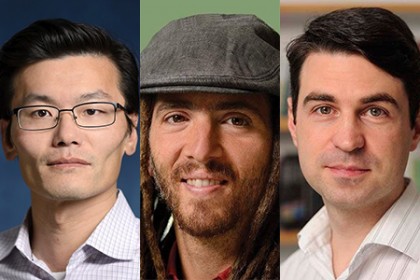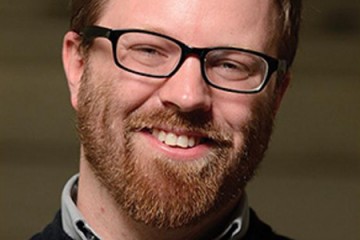Three Johns Hopkins University projects that use data science and technology in innovative ways to explore new and important scientific territories have been selected to receive Schmidt Sciences Nascent Innovation Grants. The awards went to astrophysicist Brice Ménard, mechanical engineer Sean X. Sun, and biomedical engineer Joshua Vogelstein.

Image caption: Sean Sun, Joshua Vogelstein, and Brice Ménard
This is the first time that Hopkins researchers were invited to apply for the two-year, $250,000 grants created to support pioneering and innovative projects that depart from faculty members' usual core research areas. Schmidt Sciences is part of the Palo Alto, California-based Schmidt Family Foundation, which advances original research in science, energy, and sustainability. The foundation was established in 2006 by former Google CEO Eric Schmidt and his wife, Wendy.
"We are thrilled that three of JHU's most talented and creative investigators have received Nascent Innovation Grants from Schmidt Sciences," says Denis Wirtz, vice provost for research. "Through this partnership, Drs. Menard, Sun, and Vogelstein will have the opportunity to pursue truly novel directions in their respective research endeavors. We look forward to seeing what they accomplish in the next two years with these generous awards."
More on the Hopkins recipients
Brice Ménard, associate professor in the Department of Physics and Astronomy, will develop an algorithm that reveals the underlying structure of enormous datasets that researchers grapple with today. This technique can automatically re-order a series of complex objects in such a way that global trends, if they exist, become apparent. Though this algorithm has considerable potential applications in astrophysics research, Ménard contends it will also be invaluable in most fields involving complex datasets, and even to non-scientists.
Sean X. Sun, a professor in the Department of Mechanical Engineering, will investigate how specialized cells can generate large electrical currents and potential differences across the cell cytoplasm. Sun says that the ability to harness electrical power from living cells will have wide-ranging applications in wearable devices such as pacemakers, medicine, and technology such as smartphones. He predicts that a biobattery based on living cells could one day completely replace lithium-ion batteries.
Joshua Vogelstein, an assistant professor in the Department of Biomedical Engineering, will work with Hopkins neuroscientist Richard Huganir to explore connectome coding, a discipline on the frontier of brain science that seeks to understand the relationship between genetics and experiences and synaptic connections in the brain. Vogelstein says that this project has the potential to yield incredibly large data sets that will require new analytical methods to make discoveries about how synapses are distributed in the brain and how they change with experience. The results could have ramifications for understanding and treating developmental and aging disorders, such as Alzheimer's disease.








